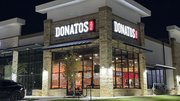Operations
Understanding FSMA Rule 204: crucial for restaurants, fast-food operators

May 30, 2024 by Jeff Cowan — Senior Director, Community Engagement, GS1 US
The Food Safety Modernization Act (FSMA) is a pivotal regulation set forth by the U.S. Food and Drug Administration (U.S. FDA) to enhance traceability in the food supply chain. It now includes a new rule that places extra responsibilities upon all stakeholders within the supply chain – including food retailers and foodservice establishments – who handle certain high-risk foods. Addressing section 204(d) of the regulation, the Food Traceability Rule is also referred to as "FSMA Rule 204" or just "FSMA 204."
Most foodborne illness outbreaks in the U.S. are linked to foods U.S. FDA has designated as "high-risk" and itemized on its Food Traceability List(FTL), which includes leafy greens, fresh cut fruits and vegetables, seafood, certain cheeses, nut butters and many other foods that are commonly served in restaurants. FSMA Rule 204 mandates detailed record-keeping for any entity that "manufactures, packs, ships, receives, processes, or holds" FTL foods to facilitate rapid traceability in the event of a recall or outbreak. The added traceability enabled by FSMA Rule 204 can help prevent foodborne illness outbreaks by aiding in swift identification and removal of contaminated products.
Since many of those foods are staples on restaurant menus, owners and operators must understand its requirements and take steps now to meet them by the U.S. FDA's January 20, 2026 deadline. FSMA Rule 204 demonstrates a commitment to food safety, essential for earning consumers' trust; adherence to The Rule also enhances operational efficiency and risk management, potentially minimizing disruptions and protecting a restaurant's brand reputation.
Using voluntary standards for compliance
Under FSMA Rule 204, stakeholders must record specific details of supply chain events (Critical Tracking Events or CTEs) involving FTL foods. The required Key Data Elements (KDEs) are designated according to each stakeholder's role, ensuring comprehensive traceability from farm-to-fork. For example, a farmer will be required to record specified data for harvesting, cooling, initial packing and shipping, while a distributor would document shipping and receiving data locations and destinations, among other details.
Foodservice operators are typically responsible for capturing Receiving KDEs, and if they transfer product to other locations they need to capture/send Shipping KDEs or any other applicable CTEs/KDEs. The required records must be kept for at least two years and be made available to the U.S. FDA upon request within 24 hours in a sortable electronic spreadsheet at minimum.
In response, applicable businesses are preparing their systems and business processes to meet FSMA Rule 204's requirements. Specifically, many stakeholders in food supply chains have been implementing or exploring the benefits of using the following voluntary GS1 Standards and business solutions, making the data easily captured with a scanner and readily exchanged between supply chain stakeholders:
- Global Trade Item Number (GTIN) for unique product identification.
- Global Location Number (GLN) for unique party and location identification.
- Global Data Synchronization Network (GDSN) for consistent and accurate descriptions of products.
- Electronic Data Interchange (EDI) and Electronic Product Code Information Services (EPCIS) for structured data capture and sharing internally and among trading partners.
While businesses with robust data management practices may have an easier time meeting FSMA Rule 204 requirements, most smaller businesses will need time to build up the necessary infrastructure. Starting preparations now is advised. A new suite of resources developed in collaboration with industry and published by GS1 US, available here, defines the best practices for product and location identification, structured product descriptions, and the recording of common industry-defined events to support the additional traceability requirements.
Ensuring compliance
FSMA Rule 204 isn't just another regulatory requirement — it's a critical tool for ensuring food safety, regulatory compliance, operational efficiency, and brand protection in the entire food industry, including foodservice. By understanding the requirements of The Rule and embracing its principles, restaurant owners and operators can uphold the highest standards of food safety, earn the trust of their customers, and safeguard the long-term success of their businesses.
If you haven't thought about FSMA Rule 204, the time is now to begin and understand how the Rule impacts your business and supply chain. Visit https://www.gs1us.org/supply-chain/standards-and-regulations/food-safety-modernization-act for more information.
About Jeff Cowan
Jeffrey Cowan is Senior Director, Community Engagement at GS1 US. In this role, he leads the Foodservice GS1 US Standards Initiative, a foodservice industry group that collaborates to improve supply chain visibility, product traceability and food safety by applying GS1 Standards to business processes.
 ChatGPT
ChatGPT Grok
Grok Perplexity
Perplexity Claude
Claude








